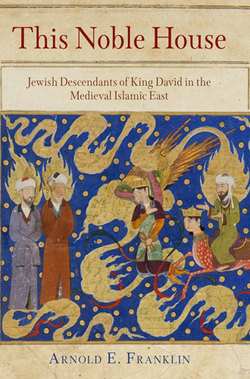This Noble House

Реклама. ООО «ЛитРес», ИНН: 7719571260.
Оглавление
Arnold E. Franklin. This Noble House
Отрывок из книги
This Noble House
Published in association with the
.....
In his systematic perusal of documents from the Geniza, S. D. Goitein discovered an abundance of fresh material on nesiʾim, significantly adding to the information first examined by Poznanski and Mann. Yet despite the new sources at his disposal, Goitein did not substantially challenge the regnant explanation for the appearance of nesiʾim outside of the Abbasid heartland, nor did he deem their popular claim of Davidic ancestry to be, in and of itself, a matter worthy of further scholarly attention. Thus, while he edited numerous documents by or about nesiʾim that allowed him to adjust aspects of Mann’s treatment, Goitein did not produce an original, synthetic assessment of their importance in the Geniza society.49 Like Mann, he regarded the nesiʾim as aspiring rulers, a perspective evident in the decision to include the only sustained discussion of them in his magisterial Mediterranean Society, a mere two paragraphs in length, in a section on leadership in the Jewish community. “[I]t is not surprising,” he writes, “that some of [the exilarchal dynasty’s] more ambitious members should have tried to make capital of their dignity as ‘princes of the House of David.’ … We find them everywhere often trying to assume authority.” And like Mann, Goitein too determined that despite their aspirations, many nesiʾim seemed to possess little in the way of what he considered to be real political power. His conclusion was that nesiʾim were in fact “of no real significance, except when they were scholarly persons of renown.”50 At times Goitein could be even more emphatically judgmental in his description of the nesiʾim, as when he characterizes them as freeloaders who shamelessly took advantage of the generosity of local Jewish communities.51
Goitein’s dim view of the nesiʾim was undoubtedly informed by his low opinion of the Babylonian exilarchate, which, in his eyes, provided the inspiration for their own, more localized ambitions. In setting up an opposition between nesiʾim who, by virtue of their laudable scholarly pursuits, achieved social and historical significance, and those who were merely self-interested political opportunists and thus of little consequence, Goitein recycles a problematic dichotomy he used earlier to draw an unfavorable comparison between the gaonate and the exilarchate. “While the gaonate,” he writes, “was a force that penetrated the whole fabric of life … the secular head of the Jews, the so-called ‘head of the Diaspora,’ whose seat was in Baghdad, had only limited importance.”52
.....